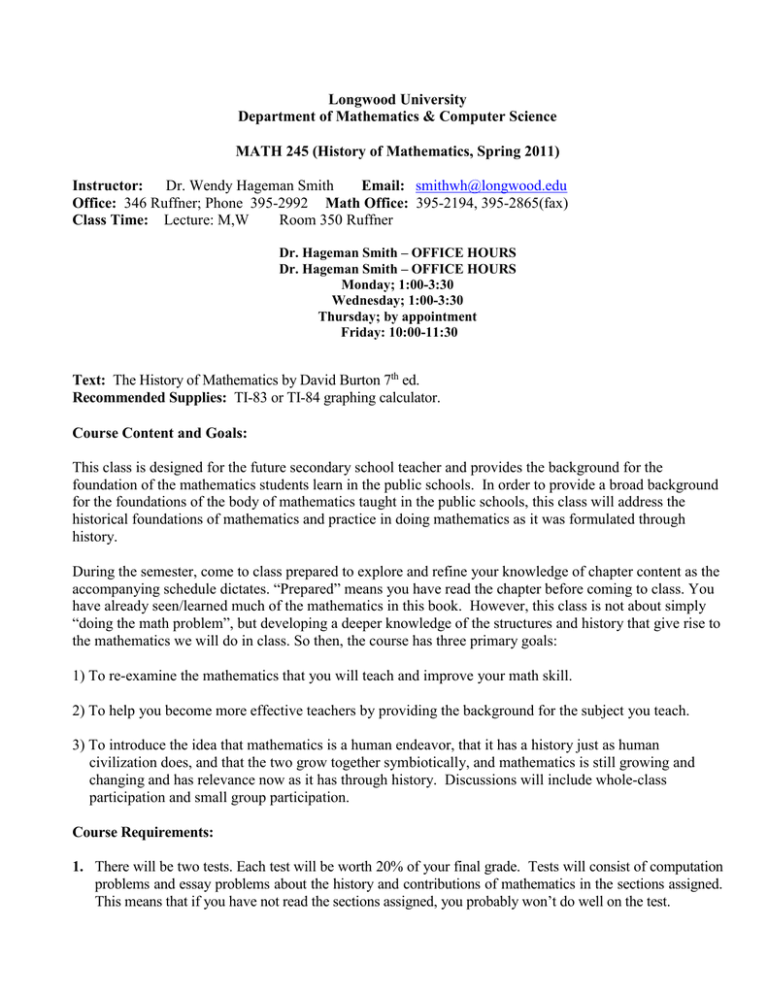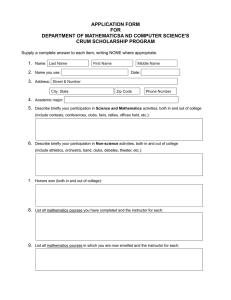MATH 245
advertisement

Longwood University Department of Mathematics & Computer Science MATH 245 (History of Mathematics, Spring 2011) Instructor: Dr. Wendy Hageman Smith Email: smithwh@longwood.edu Office: 346 Ruffner; Phone 395-2992 Math Office: 395-2194, 395-2865(fax) Class Time: Lecture: M,W Room 350 Ruffner Dr. Hageman Smith – OFFICE HOURS Dr. Hageman Smith – OFFICE HOURS Monday; 1:00-3:30 Wednesday; 1:00-3:30 Thursday; by appointment Friday: 10:00-11:30 Text: The History of Mathematics by David Burton 7th ed. Recommended Supplies: TI-83 or TI-84 graphing calculator. Course Content and Goals: This class is designed for the future secondary school teacher and provides the background for the foundation of the mathematics students learn in the public schools. In order to provide a broad background for the foundations of the body of mathematics taught in the public schools, this class will address the historical foundations of mathematics and practice in doing mathematics as it was formulated through history. During the semester, come to class prepared to explore and refine your knowledge of chapter content as the accompanying schedule dictates. “Prepared” means you have read the chapter before coming to class. You have already seen/learned much of the mathematics in this book. However, this class is not about simply “doing the math problem”, but developing a deeper knowledge of the structures and history that give rise to the mathematics we will do in class. So then, the course has three primary goals: 1) To re-examine the mathematics that you will teach and improve your math skill. 2) To help you become more effective teachers by providing the background for the subject you teach. 3) To introduce the idea that mathematics is a human endeavor, that it has a history just as human civilization does, and that the two grow together symbiotically, and mathematics is still growing and changing and has relevance now as it has through history. Discussions will include whole-class participation and small group participation. Course Requirements: 1. There will be two tests. Each test will be worth 20% of your final grade. Tests will consist of computation problems and essay problems about the history and contributions of mathematics in the sections assigned. This means that if you have not read the sections assigned, you probably won’t do well on the test. 2. You will have four quizzes throughout the semester; the quizzes are worth 10% of your final grade. Quizzes will be a reduced format version of tests. Quizzes will be designed so that if you have done the required homework and read the sections in the textbook, the quiz will take no more than 15 minutes. 3. Attendance is mandatory. Each student is expected to actively participate in all group work and class discussions. Group work for any day cannot be made up if class is missed – group work is worth 1 pt. 4. Class assignments and homework combined will constitute 15% of your final grade. 5. Homework: I will collect homework each week. Homework will consist of problems from the textbook. 6. A research project will be assigned on April 18th and due on the day of the final. The project will constitute 20% of your final grade. Specifics will be provided when the project is assigned to the class. 7. In lieu of a final test, your final for this class will consist of a presentation that will last 15 minutes. The topic will be chosen by you from a list I will provide to the class. Specifics will be provided when the project is assigned to the class. Your final presentation is worth 15% of your grade. 8. Absences are excused only for illness, college sponsored activities, and recognizable emergencies. You must assume full responsibility for all material covered during your absence. A grade of "0" will be assigned for all work missed due to unexcused absences. 9. Make-up tests will be given only when the reason for missing the test meets the criteria for an excused absence. Make-up tests will always be more difficult then regularly scheduled tests. 10. I expect you to conform to the Longwood College Honor Code as contained in the Student Handbook. All assignments and tests must be pledged. General Grading Overview Course Grades will be calculated using a 10 point scale as follows: A = 90 ~ 100 B = 80 ~ 90 C = 70 ~ 80 D = 60 ~ 70 F = 0 ~ 60 Plus and minus grades are given at the discretion of the instructor. In general, the achievement of a student in a course indicates the following: A: Superior work B: Above average work C: Average work D: Below average So I will award a grade of A only to a student who meets every standard of learning in the course, and who in addition consistently exhibits excellence in their work. Absent consistent excellence, I award a B to the student who meets every standard. I award a C to the student who has met most of the standards of learning, but continues to struggle in acquiring some key skills or concepts. I award a grade of D to a student who is capable but appears, based on their performance and effort, unable to commit themselves to achieving a minimum acceptable standard. I reserve a failing grade only for those students who do not meet minimum standards of learning, and who seem unable to do so at the level of the course. This indicates that the student must, if he or she is to continue to pursue the same educational goals, be prepared to repeat coursework and – most critical – thoughtfully reexamine their goals and priorities with an eye towards reinventing themselves as a student. Your Instructor: Please do not hesitate to come and get help if you need it. I am here to help facilitate your learning mathematics. The most important thing to remember is that I am available to help, that is my job, so do not wait until problems reach critical mass. He who hesitates is lost, so don't hesitate. You are responsible for everything that happens in class. I am of course willing to help you, but I am not willing to re-teach the course in my office. If you miss class, get the notes from someone, try the problems, and then come get help. If you have specific physical, psychiatric, or learning disabilities and require accommodations, please let me know early in the semester so that your learning needs may be appropriately met. You will need to provide documentation of your disability to the Disability Services Office. ADDITIONAL INFORMATION Students are responsible for checking the ANNOUNCEMENTS in Blackboard in advance of each class period as there will be, from time to time, important information regarding assignments, due dates, items that must be brought to the next class session, etc. Since announcements trigger an email message, check email before class to see if there are nay announcements. Also, students are responsible for downloading all needed course documents from Blackboard, printing them if hardcopies are desired, and knowing the information contained therein. Class Attendance: Students are expected to attend all classes. Work missed because of illness or other excused absences may be made up if you advise me of the absence with attendant paperwork. If you miss an exam or are late with an assignment you may be asked to provide proof that you had a legitimate reason (such as illness, certain college-sponsored activities, or recognized emergencies). When possible, you should notify the instructor in advance of assignments you expect to miss because of legitimate absences. Note: A grade of “0” or “F” may be given on work missed because of unexcused absences A course grade of “F” may be assigned when the student has missed a total (excused and unexcused) of 25 percent of the scheduled class meeting times (more than 7 absences) Acceptable excused absences (as listed in the Longwood catalog) will be taken into consideration for missed tests; however, except in VERY EXTREME circumstances, be sure to make PRIOR arrangements. Longwood’s Honor System: A strong tradition of honor is fundamental to the quality of living and learning in the Longwood community. The Honor System was founded in 1910, and its purpose is to create and sustain a community in which all persons are treated with trust, respect, and dignity. Longwood affirms the value and necessity of integrity in all intellectual community endeavors. Students are expected to abide by the Longwood College Honor Code. Assignments should be pledged, but the provisions of the Honor Code are assumed to apply to all work, pledged or not. Students are encouraged to study together and to seek help from the instructor or tutors when needed, but receiving unauthorized help or copying will be graded is a violation of the Honor Code. The Longwood Honor Code applies to all work for the course as follows: Any out-of-class practice work or hand-in assignment can include using text information, discussion with other class members, and/or discussion with instructor BUT, the final product handed-in for the grade must be the student’s own work. All tests are to be completed individually. Please sign the honor code on all exams indicating that: “I have neither given nor received help on this work, nor am I aware of any infraction of the Honor Code.” Class Schedule: Note: This schedule is tentative, small changes may be made to this schedule through the semester, according to how the class progresses, and will be announced in class before any changes are initiated. Week Jan 19 Jan 2426 Jan 31Feb 2 Feb 7-9 Feb 14-16 Chapter/Sec Introduction Text: 1.1, 1.2 BBC Film Text: 1.3 Text: 2.1, 2.2, 2.3, 2.4 Weekly Content 1.1: Tally Systems, Peruvian 1.2: Egyptian, Greek 1.3: Babylonian, Chinese Feb 2123 Text: 4.1, 4.2, 4.3 Feb 28Mar 2 Film: Archimedes Text: 4.4, 4.5 2.1/2.2/2.3 Egyptian Arithmetic and Rational Numbers 2.4: Circle Area and Truncated Pyramid Volume 2.6: Pythagorean Triples 3.1: Thales 3.2: Pythagoras Triangular and Square numbers and Zeno 3.3 Pythagorean Theorem and Incommensurables 4.1/4.2: Euclid’s Elements and Euclidean Geometry 4.3 Euclidean Algorithm and Fundamental Theorem of Arithmetic 4.4 Sieve of Eratosthenes and Ptolemy 4.5: Archimedes method of exhaustion Mar 7-9 Mar 14-18 Mar 21-23 Mar 28-30 Apr 4-6 Apr 11-14 BBC Film Text: 5.1, 5.3, 6.1 5.1, 5.3: Diophantine equations 6.1: Transmission of Arabic knowledge Apr 18-20 Apr 22-27 May 2-6 Text: 2.6 Text: 3.1, 3.2, 3.3 Assessment Quiz 1 Test 1 Quiz 2 Spring Break Text: 6.2, 7.1, 7.2 Film: Galileo Text: 8.1 Text: 8.2, 8.3, 8.4 BBC Film Text: 9.1, 9.3 6.2: Hindu-Arabic Numerals and Fibonacci 7.1/7.2: Tartaglia and Cardano 8.1: Galileo 8.2: Descartes Cartesian geometry and perspective 8.3/8.4: Newton and Leibniz 10.1 Origins of probability 9.3 Bernoulli: Text: 10.2, 10.3 10.2 Fermat and Euler: Number Theory 10.3 Gauss: Congruence Theory Text: 11.3, 12.2 11.3 Cauchy, Weierstrass, and Hilbert 12.2: Poincare’ and Cantor Finals Week Final May 5 11:30-2:00 Quiz3 Test 2 Quiz 4 Final presentation assigned Final



